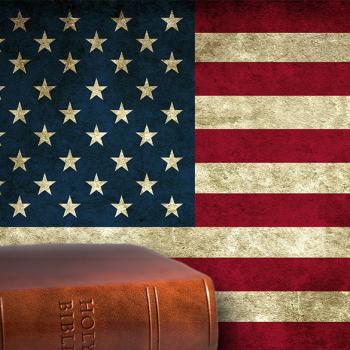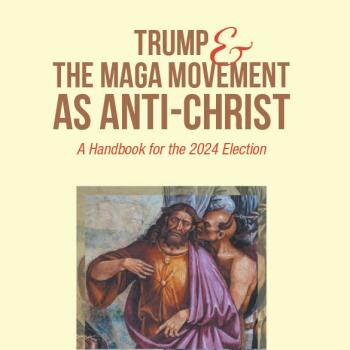
American Christianity has been working since the beginning of the country to bring about a Christian nation. However, the definition of what a Christian nation actually is has changed throughout the centuries. I have touched on the history of the Church and my opinion on what Christianity has to say about the Constitution here.
The idea of a Christian nation has been in flux since 1620, when Plymouth Colony’s ‘Bible Commonwealth’ was formed to be a ‘city upon a hill’. The purpose was to bring about the thousand year reign of Jesus, particularly in America. How this was to be brought about is a matter of eschatology, or the theories of the end times. Much of eschatology comes from the book of Revelation as well as some passages in Daniel and other prophets. There are 3 dominant views of the end times in the Church during the 19th and 20th centuries. First, premillennialism believes that a literal 1,000 year reign of Christ on earth will happen after the Second Coming. Post-millennialism believes this ‘Millennial Kingdom’ comes before Christ’s return. Finally, a-millennialism says that there is no literal thousand year reign but the Second Coming brings about eternity.
THE CHRISTIAN MISSION
The differences of these interpretations of the end times drastically change the way we view the mission of the Church. This can also change our political agenda. A-millennialism was the dominant eschatology for most of Church history but not in America. The Reformation saw the rise of both pre and post-millennialism – which is what we see most in America today.
Post-millennialism believes that the millennial reign of Christ will be brought about through the positive spiritual and moral influence of the Church. This movement towards the better led to the first public hospital in the Byzantine Empire, the abolition of slavery spearheaded by Quaker, Methodist, and some Baptists, and worker’s rights at the turn of the 20th century.
Premillennialism believes that the millennium will be ushered in through a violent set of natural and political events that takes Revelation literally. A premillennialist will see the world (or America in particular) as getting worse, not better. A correlating belief to that of premillennialism is that these apocalyptic events will only start once the whole world has been exposed to the teachings of Jesus. These two beliefs have led Christian organizations to send missionaries across the world to help poor and impoverished areas with food, supplies, and Christianity.
Premillennialism has become even more popular in America. The rise of Evangelicalism and Fundamentalism has definitely played an important role in this change. World War I and II also took its toll on the validity of post-millennialism.
I AM BIASED…
I grew up in the premillennialism tradition. Not only that, I had all the Tribulation charts, knew the timeline, and was watching for the signs of the end times! However, I am now biased against this view. My interpretation of Revelation was a catalyst to change, but we have also seen how politics and premillennialism intersect. This view of the world can lead politicians and people in power to do things that are damaging.
THE CONSEQUENCES
The first, most pervasive consequence of the pre-mill theology is a fear that the world is getting worse. The fact is, the majority of quantitative measures of quality of life are improving. On one side, violent crimes and child mortality rates are declining. At the same time, we see an increase of life expectancy, access to education and literacy. While these are not inherently Christian, these outcomes would (and should) be considered a great relief to those who fear the world. I would argue that Christian organizations and charities have played a role in these positives. Yet the belief that the world must get worse in order for the Second Coming makes it challenging to square these things.
The second consequence of a premillennial view of eschatology is the absolute support of Israel. In the pre-mill view, in order for Jesus to return, Israel must be back in the Holy Land. The problem with this is that America is now supporting an apartheid state where the Palestinians are unequal to the Israelis. While peace in the Middle East is a challenging endeavor, the Trump administration moving the U.S. embassy to Israel to Jerusalem is a blatant play towards the Evangelical base. This move was also signed off and continued by Biden, furthering the bipartisan appeal to premillennialism. These types of theo-political moves will have severe consequences for decades to come.
WHAT NOW?
The way we think about the future determines how we act today. If we think that the world must get worse before Jesus’ return, it can be easy to try to steer into it. Our job as Christians in America is to help our neighbor – which is an act of good. When we choose to do good and just things, we create a world that is not getting worse. We can create the Kingdom of God on earth today.
Premillennialism is not a bad belief system on its own. Honestly, it makes a lot of sense when we’re constantly reading about the latest shootings and wars. Premillennialism fails when it becomes how we run our lives instead of how we interpret our surroundings. Let’s make sure we run towards our neighbor instead of towards destruction.













